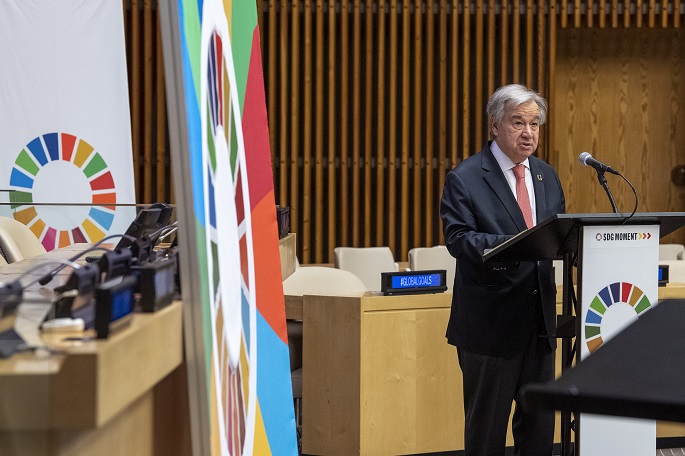UN chief urges joint efforts to improve global governance
Published : 21 Sep 2020, 19:20
United Nations (UN) Secretary-General Antonio Guterres on Monday urged the international community to work together to improve global governance and noted a worldwide need for the organization, reported Xinhua.
"National sovereignty -- a pillar of the United Nations Charter -- goes hand-in-hand with enhanced international cooperation based on common values and shared responsibilities in pursuit of progress for all," Guterres said at the UN General Assembly ceremony marking the 75th anniversary of the UN.
"No one wants a world government -- but we must work together to improve world governance," he noted.
Noting that "today we have a surplus of multilateral challenges and a deficit of multilateral solutions," the secretary-general said, adding, "in an interconnected world, we need a networked multilateralism, in which the United Nations family, international financial institutions, regional organizations, trading blocs and others work together more closely and effectively."
"We also need as the (General Assembly) president said, an inclusive multilateralism, drawing on civil society, cities, businesses, local authorities and more and more on young people," he added.
On the founding of the UN, Guterres said "the ideals of the United Nations -- peace, justice, equality and dignity -- are beacons to a better world."
"The organization we celebrate today emerged only after immense suffering," he said. "It took two world wars, millions of deaths and the horrors of the Holocaust for world leaders to commit to international cooperation and the rule of law."
Talking about the achievements of the UN, Guterres said that "a third World War -- which so many had feared - has been avoided. Never in modern history have we gone so many years without a military confrontation between the major powers."
"This is a major achievement of which member states can be proud -- and which we must all strive to preserve," he said.
"Down the decades, there have been other historic accomplishments, including peace treaties and peacekeeping, decolonization, human rights standards -- and mechanisms to uphold them, the triumph over apartheid, life-saving humanitarian aid for millions of victims of conflict and disaster, the eradication of diseases, the steady reduction of hunger, the progressive development of international law, and landmark agreements to protect the environment and our planet," he elaborated.
"Most recently, unanimous agreement on the Sustainable Development Goals and the Paris Agreement on Climate Change provide an inspiring vision for the 21st century," he noted.
However, "there is still so much to be done," Guterres said, adding "of the 850 delegates to the San Francisco Conference, just eight were women. Twenty-five years since the Beijing Platform for Action, gender inequality remains the greatest single challenge to human rights around the world."
"Climate calamity looms. Biodiversity is collapsing. Poverty is rising. Hatred is spreading. Geopolitical tensions are escalating. Nuclear weapons remain on hair-trigger alert. Transformative technologies have opened up huge new opportunities but also exposed new threats. The COVID-19 pandemic has laid bare the world's fragilities," he continued.
Noting that he welcomes the General Assembly's 75th anniversary declaration and commitment to reinvigorate multilateralism, the UN chief said "we need more -- and more effective -- multilateralism, with vision, ambition and impact."
People around the world "shared their fears and hopes for the future," stressing the need for international cooperation and solidarity against COVID-19, and for health systems and basic services for all, he said.
Meanwhile, they are "fearful about the climate crisis, poverty, inequality, corruption and systemic racial and gender discrimination," he said.
"They see the United Nations as a vehicle to make the world a better place," the UN chief noted. "And they count on us to meet today's tests."
"That lies above all with member states," which "established the United Nations and have a duty to embrace it, nourish it and provide it with the tools to make a difference," he stressed.
"We owe this to 'we the peoples.' We owe it to the peacekeepers, diplomats, humanitarian personnel and others who sacrificed their lives advancing common values. Our organization's founders began their work during the heat of conflict. Now it falls to us to chart our way out of danger," Guterres said.
"In the words of our Charter, let us combine our efforts to achieve these aims' as United Nations," he concluded.


